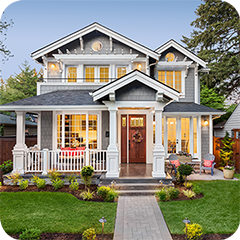- Fixed or variable-rate mortgage?
- What is the difference and benefits in short and long term mortgages?
- What is a pre-approved mortgage?
- What is CMHC (Canada Mortgage and Housing Corporation)?
- What is the minimum down payment needed to purchase a home?
- What is a home inspection and should I have one done?
The interest rate on a fixed-rate mortgage is set for a pre-determined term – usually between 6 months to 10 years. This offers the security of knowing what you will be paying for the term selected.
A variable mortgage is a mortgage in which payments are fixed for the duration of your selected term. In this time, interest rates may fluctuate from month to month depending on market conditions. If interest rates go down, more of the payment goes towards reducing the principal; if interest rates go up, then a larger portion of the monthly mortgage payment goes towards covering the interest.
Mortgages are available in terms of different lengths – a 1 to 5 year, 7 year, and 10 year terms are the most common. Interest rates on shorter-term mortgages are typically lower than those of longer-term mortgages due to several factors. One of the main factors is interest rates the lenders pay on client deposits which are then lent out via mortgages, lines of credit, etc., along with administrative costs and general economic factors which are more predictable in the shorter term.
Short and long-term mortgages each have their own benefits depending on your individual situation, personal preferences and comfort level. If you think rates may drop in the near future, you may choose a short-term mortgage in the hopes of taking advantage of lower rates when your term ends. If you think interest rates are going to rise, you may choose a fixed-rate, longer-term mortgage to secure a lower rate that you can count on for payments that suit your comfort level. It’s also possible that over the longer term, the fixed rate may end up being lower than the effective interest rate of shorter terms renewing over that time period.
A pre-approved mortgage provides an interest rate guarantee from a lender for a specified period of time, and for a set amount of money. This time frame is usually 60 to 120 days. The pre-approval is calculated based on information provided by purchaser(s) and may be subject to certain conditions being met before the mortgage is finalized. Conditions would usually be things like ‘written employment and income confirmation’ and/or ‘down payment’.
Most successful real estate professionals will want to ensure you have a pre-approved mortgage in place before they take you out looking for a home. This is to ensure that they are showing you property within your affordable price range. A pre-approved mortgage is one of the first steps a home buyer should take before beginning the buying process.
Mortgage loan insurance is typically required by lenders when home buyers make a down payment of less than 20% of the purchase price. Mortgage loan insurance helps protect lenders against mortgage default, and enables consumers to purchase homes with a minimum down payment of 5% — with interest rates comparable to those with a 20% down payment.
To obtain mortgage loan insurance, lenders pay an insurance premium. Typically, your lender will pass this cost on to you. The premium payable is based on a percentage of the home’s purchase price that is financed by a mortgage. The premium can be paid in a single lump sum or it can be added to your mortgage and included in your monthly payments.
Mortgage loan insurance is not to be confused with mortgage life insurance which guarantees that your remaining mortgage at the time of your death will not be a burden to your estate.
Having a down payment that meets certain requirements is necessary for many prime lenders. This is the portion of the purchase price that you pay out of pocket. To qualify for a conventional mortgage, you will need a minimum down payment of 20% of the total purchase price of the property.
The larger the down payment, the less your home costs in the long run. With a smaller mortgage, interest costs will be lower and over time this will add up to significant savings.
You can, however, qualify for a high ratio insured mortgage with a down payment as low as 0% – 5%. Most lenders now offer insured mortgages for both new and resale homes with lower down payment requirements than conventional mortgages. Low down payment mortgages must be insured to cover potential default of payment, and their carrying costs are therefore higher than a conventional mortgage because they include the insurance premium.
A home inspection is a visual examination of the property, performed by a certified professional home inspector before the purchase of the home is complete. The property inspection is to determine the overall condition of the home. The property inspector will check all major components such as the roof, ceilings, walls, floors, foundations, crawl spaces, attics, retaining walls, etc… The inspection will also check all systems such as electrical, heating, plumbing, drainage, exterior weather proofing.
The results of the inspection should be provided to the purchaser in detailed written form, generally within 24 hours of the inspection. A pre-purchase home inspection can add peace of mind and make a difficult decision much easier. It may indicate that the home needs major structural repairs which can be factored into your buying decision. A home inspection helps remove a number of unknowns and increases the likelihood of a successful purchase.




